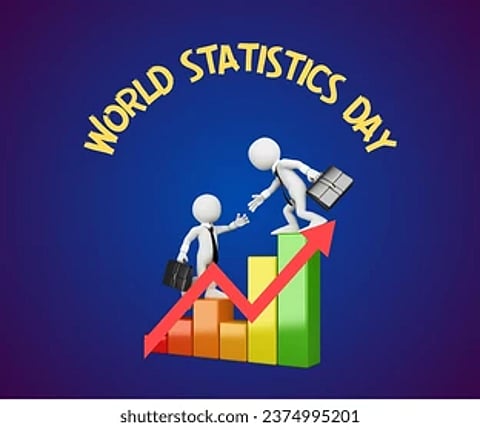

Today is World Statistics Day. World Statistics Day, observed every year on October 20, is a global celebration dedicated to raising awareness about the pivotal role that advanced, reliable, and high-quality statistics. Statistics will play in the development of person, family of establishment or government, and nations of worldwide.
Yes indeed! To run a family, a housewife has to do calculations every day. If an average person is to survive, he has to check savings and expenses minute to minute. Calculation of marks for a student to pass the examinations is necessary. For a leader to win an election, caste-wise votes are counted. Calculations of the revenue and expenditure to run the government are essential. Without numbers and figures for every work, nothing moves forward. World Statistics Day is a day dedicated to highlighting the importance of official statistics and data in decision-making, policy development, and research at the global, national, and local levels. It serves as a reminder of the critical role that statistics play in improving the quality of life for people around the world.
United Nations General Assembly’s Initiative:
World Statistics Day was first celebrated on October 20, 2010. World Statistics Day is a relatively recent observance, established by the United Nations to emphasize the importance of statistics in decision-making, policy development, and research. The primary purpose of this observance is to recognize and celebrate the remarkable achievements of national statistical systems and to underscore the profound relevance of statistics across various facets of society.
It was officially established by the United Nations to acknowledge the significance of statistics and data in addressing global challenges and to raise awareness about the role of statistics in improving human societies. The inaugural celebration marked the importance of statistical data and its impact on policy decisions, economic development, and addressing key issues such as poverty, inequality, and environmental sustainability.
The United Nations designated October 20 as World Statistics Day because it also coincides with the final day of the 42nd session of the United Nations Statistical Commission. This Commission plays a crucial role in advancing the development of global statistics and promoting international cooperation in this field.
World Statistics Day serves as an opportunity for statisticians, government agencies, international organizations, and other stakeholders to come together to recognize the importance of official statistics and promote the responsible and ethical use of data for the betterment of society. It also emphasizes the critical role of statisticians and data professionals in producing, analyzing, and disseminating data to support informed decision-making at the global, national, and local levels.
Informed Decision-Making & Sustainable Growth:
Accurate and reliable statistics are crucial for policymakers, governments, and organizations to make informed decisions. These decisions can range from economic policies to public health measures and environmental protection strategies. The United Nations Sustainable Development Goals (SDGs) rely heavily on data to measure progress. World Statistics Day underscores the importance of data in monitoring and achieving these goals, which address global challenges like poverty, inequality, and environmental sustainability.
Transparency and Accountability:
Statistics help ensure transparency and accountability in both the public and private sectors. They provide a basis for evaluating the effectiveness of government programs, corporate performance, and the allocation of resources. Data means evidence-based research. It is the foundation of scientific research and analysis. Researchers in fields such as economics, sociology, public health, and environmental science rely on statistics to draw meaningful conclusions and contribute to human knowledge.
Use of Data in Disaster Preparedness and Monitoring:
In times of crisis, whether natural disasters or pandemics, timely and accurate data are essential for effective response and recovery efforts. Organizations and governments use statistics to monitor progress, evaluate the impact of policies and programs, and adjust their strategies accordingly.
How Statistics Use for Development Activity:
Economic Development: For economic growth and development, it's essential to track and analyze economic indicators, such as GDP, inflation rates, and employment statistics.
Health and Education: Statistics are crucial for assessing and improving public health outcomes and education systems. They help identify trends, disparities, and areas in need of improvement.
Global Cooperation: International organizations and governments collaborate to collect and share data on global issues, such as climate change, trade, and public health. Accurate and consistent statistics are essential for such cooperation.
When technology is growing rapidly, it is very necessary to ensure the concerns about the data privacy and security. In an age of increasing concern about data privacy and security, World Statistics Day can also raise awareness about the responsible and ethical use of data.
